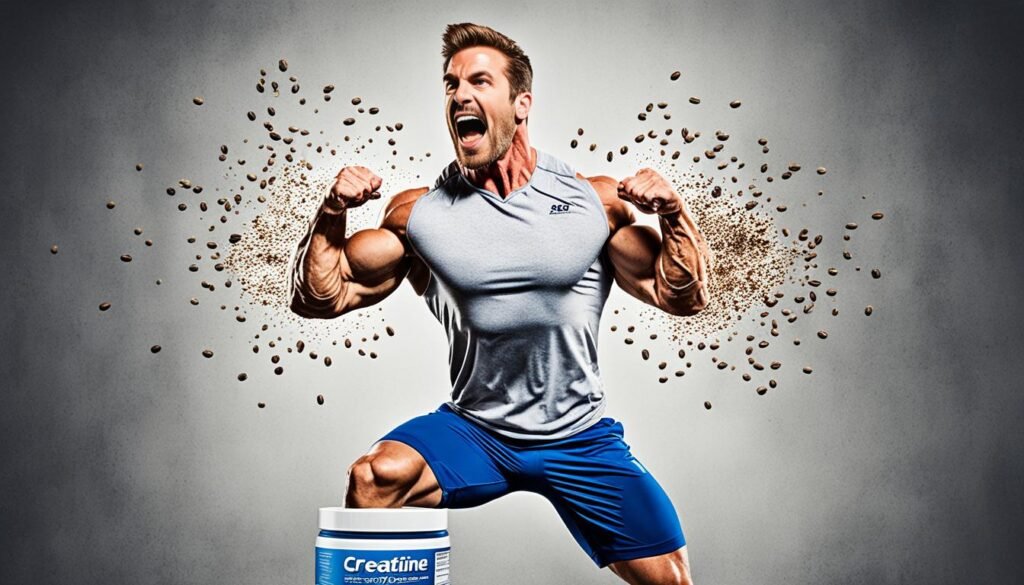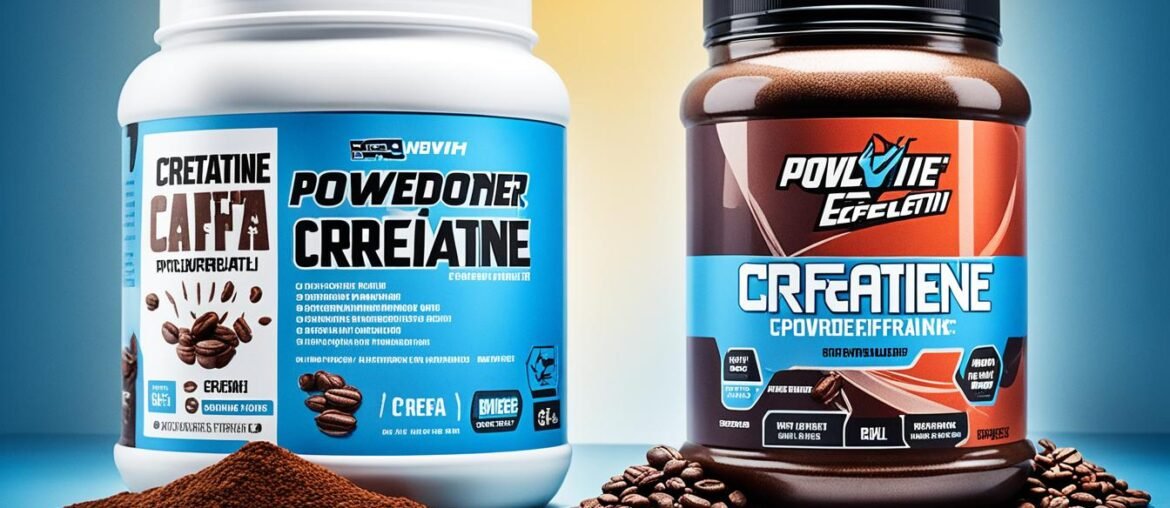Every minute, athletes and fitness enthusiasts around the globe consume over 10,000 servings of creatine and caffeine, with a good portion of them combining these popular ergogenic aids in search of the ultimate performance enhancement. The intriguing relationship between creatine and caffeine, hinged on their potential to augment energy and workout efficacy, sparks a compelling dialogue in the fitness community. As a fitness aficionado, I’ve delved into the science and reality behind these substances, examining whether the combination of creatine and caffeine aids or impedes your goals. Looking closely at creatine supplements, which play a pivotal role in energy metabolism, and contrasting caffeine intake, which acts on the nervous system, raises crucial questions about their concurrent use for performance enhancement with creatine and caffeine.
In this article, I’m exploring the cellular machinations of both substances; dissecting the interplay between the caffeine-induced vigilant state and creatine’s subtle yet significant power boost within the muscle fibers. Specifically, I’ll address how the combination of creatine and caffeine may affect hydration and metabolic performance, giving you the insights you need to make informed decisions about your supplement regimen. The juxtaposition of the physiological pathways influenced by these two supplements offers a fascinating snapshot of how we can potentially optimize our fitness routines.
Key Takeaways
- The simultaneous intake of creatine and caffeine is prevalent among fitness enthusiasts seeking a dual energy boost.
- Creatine supplements contribute to ATP energy production essential for muscle contractions, while caffeine helps reduce fatigue by blocking adenosine receptors.
- Concerns about dehydration and metabolic interference when combining these supplements necessitate a closer examination of their effects.
- Understanding the distinct ways creatine and caffeine function is key to determining their combined efficacy for performance enhancement.
- Exploring the safety and synergistic potential of creatine and caffeine requires a balance between scientific evidence and individual responses to supplementation.
The Distinct Energy Boosts of Creatine and Caffeine
As I delve into the nuanced realms of sports nutrition, it becomes evident that supplements like creatine and caffeine hold a venerable position due to their unique properties and effects on the human body. With a focus on the specifics of their energy augmentation capabilities, I aim to provide a clear understanding of their physiological impacts.
Understanding Creatine as a Phosphate Donor
In the intricate dance of cellular metabolism, creatine benefits include its pivotal role as a phosphate donor, especially significant in ATP production, the fundamental energy-carrying unit of our cells. The process rejuvenates ATP from ADP, enabling sustained physiological exertion, a boon for athletes requiring consistent power output and rapid recovery.
How Caffeine Enhances Mental Arousal and Focus
Turning my attention to caffeine, its recognition springs from the unmistakable stimulatory effects. Caffeine’s molecular prowess lies in its ability to mimic adenosine, a fatigue-inducing compound, and occupy its binding spots. By attaching to adenosine receptors with a competitive edge, caffeine essentially cloaks the sensation of tiredness, bestowing heightened alertness and concentration, benefiting those in need of mental acuity.
| Creatine | Caffeine |
|---|---|
| Directly increases ATP reserves | Does not increase ATP but blocks adenosine reception |
| Enhances short-term physical performance | Boosts alertness and reduces the perception of fatigue |
| Mainly impacts muscle cells | Affects the central nervous system |
| Provides sustained energy boost | Delivers immediate stimulation |
The juxtaposition of creatine’s role in establishing ample energy reserves and caffeine’s dynamic readiness enhancement underscores their synergy when considered for supplementation strategies. I remain committed to further exploring these interactions, as understanding their distinct yet potentially harmonious qualities can lead to optimized nutritional planning.
Evaluating the Bodybuilding Benefits of Creatine

My exploration into the bodybuilding benefits of creatine has revealed a wide spectrum of advantages for those seeking to enhance their fitness regimen. Perhaps the most well-documented of these is the improvement in muscle mass and strength. It’s no wonder that creatine has become a mainstay in the supplement arsenal of bodybuilders and athletes alike. What’s particularly compelling is creatine’s ability to bolster ATP production and protein synthesis, crucial processes in elevating one’s physical capabilities.
In my hands-on experience with this potent supplement, I’ve noted not only a substantial leap in my strength but also a marked delay in the fatigue that would typically hinder my training sessions. This is attributed to creatine’s role in lactic acid buffering, a key factor that allows me to persist in intense physical activities for longer periods.
Fascinatingly, its perks extend to improving cognitive performance, and I’ve observed firsthand the way it sharpens my mental edge—providing a clarity that is incredibly beneficial both in and outside the weight room. Here’s a closer look at how creatine has influenced both my muscle-building endeavors and cognitive function:
- ATP replenishment leading to prolonged high-intensity training sessions
- Enhanced protein synthesis supporting faster muscle recovery and growth
- Lactic acid buffering facilitating longer workouts without the typical burnout
- Improved cognitive stamina, aiding in maintaining focus and coordination during complex lifts
Apart from anecdotal evidence and my personal observations, scientific studies back these bodybuilding benefits of creatine, making it a credible and reliable choice for those looking to get the most out of their workouts. Here’s a simplified breakdown of these advantages in a comparative table:
| Bodybuilding Benefit | Details | My Observations |
|---|---|---|
| Muscle Mass and Strength | Accelerates hypertrophy and increases force output | Noticeable gains in both size and power |
| ATP Production | Enhances energy availability for peak muscle contractions | Sustained energy throughout workouts |
| Protein Synthesis | Promotes muscle repair and growth | Faster recovery and reduced muscle soreness |
| Lactic Acid Buffering | Delays the onset of muscle fatigue | Extended periods of high-intensity training |
| Cognitive Performance | May improve memory, attention, and reaction time | Sharper mental focus during complex movements |
Incorporating creatine into my training strategy has proven to be a game-changer, not only propelling my physical growth but also reinforcing my mental acuity. Truly, the scope of creatine’s impact on bodybuilding is comprehensive, supporting my assertion that it remains an indispensable supplement for athletes who are earnest about maximizing their performance.
Combining Creatine with Caffeine: An Overview
As a fitness enthusiast, I’ve personally witnessed a growing trend in the health community where individuals are mixing creatine and caffeine to push the boundaries of their physical and mental performance. It’s an attempt to create something akin to supplement synergy, with both ingredients offering their distinct advantages. The pros of combining creatine and caffeine have been a frequent topic of debate, prompting both curiosity and caution amongst athletes and fitness aficionados alike.
On one hand, creatine is lauded for its role in generating optimal muscle-fueling energy, while caffeine is appreciated for its ability to provide a quick, effective mental boost. Many assert the notion that caffeine’s diuretic effect might be problematic when paired with creatine due to potential dehydration concerns. However, based on my research and experience, I’ve seen an increasing number of studies challenging this assertion, indicating that the risk of dehydration might not be as severe as once thought.
When exploring the pros and cons of combining creatine and caffeine, one should carefully consider the potential for increased physical performance against the possibility of experiencing side effects, such as gastric discomfort, which remains an issue for some users. Here’s a closer look at how these two popular supplements stack up together:
| Creatine Benefits | Caffeine Benefits |
|---|---|
| Enhances muscle mass and strength through ATP production | Provides immediate energy and heightened alertness |
| Contributes to long-term endurance and power | Improves concentration and potential fat loss benefits |
| May buffer lactic acid during high-intensity activities | Acts as a stimulant for short-term performance boosts |
Despite these appealing benefits, skepticism around combining these supplements persists. Some users report digestive issues, and the diuretic effect of caffeine may require a closer examination of hydration strategies, especially during rigorous workout sessions. Yet, supplement synergy remains a powerful driving force for many, as they seek to harness the best of both worlds — the immediate lift from caffeine and the sustainable, muscle-building properties of creatine.
- Maximize ATP production for optimal muscle-fueling energy
- Mitigate caffeine’s diuretic effect with proper hydration
- Assess individual tolerance to find the right balance
In my journey to enhance both fitness levels and cognitive function, I’ve come to appreciate the balance required in using these supplements responsibly. The interplay between creatine and caffeine, though complex, opens the door to innovative ways to fuel workouts and recover efficiently. As always in the realm of health and wellness, individual experiences may vary, and what works for one might not for another. Nonetheless, the alliance of creatine and caffeine continues to intrigue, yielding both challenges and breakthroughs in the quest for optimal muscle-fueling energy.
Can You Reap the Benefits of Creatine and Caffeine Together?

The intriguing potential of a creatine and caffeine synergy has sparked considerable discussion in the fitness community. Advocates of supplement stacking suggest that the concurrent use of these two can amplify both short- and long-term benefits for enthusiasts looking to optimize their health and workout routines.
The Synergistic Energy Enhancement
Those who integrate creatine into their exercise regimen commonly report substantive increases in muscle tissue accumulation and strength over time. Caffeine, in contrast, is widely recognized for its immediate effects on concentration and performance, offering an acute burst of energy which can be leveraged for more intense workouts. When used in combination, these supplements have the potential to augment each other’s effects, leading to a more robust and energetic exercise session.
Immediate and Gradual Health Benefits
In examining the relation between these supplements and thermogenic fat loss, findings suggest caffeine may contribute to increased calorie burn during workouts. Creatine, meanwhile, may assist in elevating resting metabolism through heightened muscle mass. As I explore the practicalities of integrating these substances into a regular regimen, the prospect of achieving both immediate and sustained improvements in body composition becomes more apparent.
| Benefit | Creatine | Caffeine |
|---|---|---|
| Energy Provision | ATP replenishment leading to sustained strength | Immediate stimulation for workout performance |
| Muscle Building | Long-term muscle mass accumulation | Contributes indirectly through increased workout intensity |
| Fat Loss | Enhances resting metabolic rate | Stimulates acute thermogenic calorie burning |
| Cognitive Function | Supports cognitive performance indirectly through health benefits | Enhances alertness and concentration |
The Debate on Hydration: Creatine and Caffeine Risks
When it comes to discussing the hydration dynamics influenced by supplements such as creatine and caffeine, a thick fog of myths persists around their true effects. Diving into this subject requires not just an understanding of the science at hand, but also the ability to separate fear from fact.
Myths and Facts About Dehydration
The common narrative suggests that creatine might cause the muscles to hoard water, while caffeine could pull the body towards dehydration. Yet, a closer review of scientific studies indicates the real scenario is far less worrying. The risk of creatine and caffeine dehydration, if managed with mindful fluid intake, does not warrant the concern it often receives in the fitness and health communities. Now, let’s dispel some myths about hydration and scrutiny the supposed water retention and diuretic effects these supplements have.
Monitoring Water Intake When Supplementing
In my professional perspective, ensuring adequate hydration with supplements like creatine and caffeine boils down to attentive self-monitoring. Given their popularity and overlap in the fitness community, understanding the interaction between these supplements and hydration is paramount. Regularly tracking your water intake becomes crucial, particularly when engaging in activities that swell the demand for hydration.
Moreover, it is essential to approach hydration not just from a quantity perspective, but also in terms of timing and relation to your workout regimen. Ensuring fluid replenishment pre and post-exercise, in alignment with your caffeine and creatine schedule, can help maintain optimal hydration levels. Here’s a comparative view to help navigate the hydration landscape with these supplements:
| Supplement | Common Myths | Actual Risks | Hydration Strategy |
|---|---|---|---|
| Creatine | Causes excessive water retention | Mild increase in muscle water content | Drink an additional 8-12 ounces on training days |
| Caffeine | Leads to severe dehydration | Moderate diuretic effect without causing dehydration | Replace fluids lost through increased urination |
In the realm of my professional writing, the key takeaway here is that both widespread myths about dehydration risks due to creatine and caffeine and the practices that are rooted in these myths, need to be revisited. To attain a state of adequate hydration while on these supplements, it’s a matter of balance and awareness, rather than avoidance or concern.
Optimizing the Combination of Creatine and Caffeine in Your Diet

When it comes to fine-tuning your supplement intake for enhanced training outcomes, the fusion of creatine and caffeine warrants particular consideration. Both compounds, known for their unique abilities to elevate performance, could very well be the key players in your nutritional arsenal for achieving specific fitness goals. With a deliberate focus on supplement timing and a stacking strategy, I’ll dive into the approach to balancing these supplements for an optimized workout regimen.
The Role of Timing in Supplement Consumption
My experience emphasizes that the timing of your supplements plays a pivotal role in how effectively they can support your fitness endeavors. Creatine, for example, seems to offer the greatest benefits for muscle growth and strength when ingested just before or after a resistance training session. Meanwhile, caffeine exhibits its peak cognitive and physical benefits when consumed pre-workout, providing that much-needed burst of energy during intense exercise bouts. Adherence to this timing strategy could very well be a game-changer in your quest for performance optimization.
Emerging consensus suggests that strategically timed creatine and caffeine consumption leads to more prominent training adaptations and performance enhancements.
Recommended Dosages for Performance Optimization
For day-to-day progress and substantial gains, establishing a consistent and optimally dosed schedule for ingestion of these supplements is indispensable. Daily creatine intake recommendations often linger around 5 grams per day for maintenance post an initial loading phase, which provides a saturation effect needed for muscular performance. As for caffeine, dosages can vary widely based on individual tolerance, but an average of 3-6 milligrams per kilogram of body weight is suggested before workouts to stimulate alertness and improve concentration. Integrating these guidelines into a supplement stacking strategy is integral for maximizing exercise outcomes and should be tailored to individual needs and responses.
An effective stacking strategy doesn’t just look at dosages and timing in isolation; it considers the collective impacts of these supplements on your routine. Aligning creatine and caffeine consumption with your specific exercise plan can be a catalyst for enhanced physical performance and potential body composition improvements.
In practice, fine-tuning this dynamic duo—creatine and caffeine—in your dietary routine is not a static process. It requires ongoing adjustments and close monitoring of responses, ensuring that the strategy continually resonates with your evolving fitness goals and preferences. Always remember, what works for one might not work for another, making personalization key in the pursuit of excellence in performance optimization.
Pros and Cons of Mixing Creatine and Caffeine

As someone deeply entrenched in the analysis of health supplements, I’ve been closely examining the pros and cons of creatine and caffeine within a fitness context. The allure of stacking these supplements is rooted in their distinct energy mechanisms, offering the potential for amplified benefits. For instance, the short- and long-term effects of combining these two can lead to immediate performance boosts and progressive muscle mass gains respectively. This dual-impact approach caters to those seeking varied enhancements over different timeframes.
On the flip side, some fitness enthusiasts raise concerns over the risks, particularly the possibility of dehydration and gastrointestinal discomfort. Although the combined use of creatine with caffeine may theoretically exacerbate these issues, it ultimately comes down to individual responses—a facet that must be considered when deciding on supplement intake.
- Pros:
- Enhanced energy production through synergistic mechanisms
- Immediate cognitive and physical performance improvements
- Sustained benefits including increased muscle mass and strength over time
- Cons:
- Potential for compounding the risk of dehydration
- Incidence of gastrointestinal discomfort in sensitive individuals
While I value the advantages of this powerful combination, my priority is always towards a balanced and responsive approach to supplementation. It’s vital to listen to your body and assess its reactions to mixing creatine and caffeine, ensuring optimal results and well-being.
Latest Research on Creatine and Caffeine Supplementation

As a journalist who keeps an eye on the latest trends and research on supplements, recent studies on creatine and caffeine have certainly caught my attention. These studies delve into the nuanced effects that these supplements can have on muscle mass improvement and exercise performance enhancement. Particularly interesting is how the interactions between creatine and caffeine may influence resistance training outcomes.
Effects on Muscle Mass and Exercise Performance
Supplementation with creatine has been long known for its benefits in muscle mass increase and strength enhancement. Yet, when I dug into the latest research, it appeared that the combination of creatine with caffeine could be counterproductive. Curiously, the expected performance boost was somewhat blunted when both supplements were ingested simultaneously.
Interactions and Their Impact on Athletic Outcomes
Our review of contemporary studies highlights a fascinating conundrum regarding the pharmacokinetic properties of creatine and its ability to enhance muscle relaxation. Even more intriguing are the potential reasons why these benefits might be reduced when caffeine is introduced into the equation. The science behind creatine and caffeine interactions remains complex and suggests that athletes may need to reconsider their supplementation timing and combination strategies.
| Study Focus | Creatine Alone | Creatine with Caffeine |
|---|---|---|
| Muscle Saturation | High | High |
| Performance Enhancement | Improved | Unchanged/Diminished |
| Muscle Relaxation | Enhanced | Potential Interference |
| Recommendation for Athletes | Beneficial | May Require Strategy Adjustment |
Conclusively, the dance between creatine and caffeine in our systems requires a precise choreography that is yet to be perfected. As these supplements continue to be staples for many in the pursuit of peak physical condition, my role is to provide the insights and facts that emerge, allowing readers to make well-informed decisions about their supplementation routines.
Real-life Experiences with Creatine Supplements and Caffeine Intake

When discussing the impact of combining creatine and caffeine on exercise and cognitive function, there’s no substitute for firsthand accounts. My personal journey with these supplements has provided a unique perspective into the rich tapestry of athletic performance enhancement and the complexities of individual response variability. Through interviews and community interaction, I’ve gathered a wealth of anecdotal evidence that illuminates the diverse experiences of fellow athletes and fitness enthusiasts.
Personal Accounts of Enhanced Performance
The infusion of energy from caffeine coupled with the muscle-boosting properties of creatine has been a game-changer for many, including myself. Sharing personal experiences with creatine and caffeine, some individuals have conveyed significant improvements in the gym, spanning increased strength to sustained endurance. These accounts often capture the essence of diligence and the relentless pursuit of peak performance. This synergy has been especially prevalent in demanding workouts where both mental and physical tenacity are paramount.
Acknowledging Individual Variations in Response
However, an important aspect that these shared experiences have crystallized is that supplement intake strategies vary greatly from person to person. Gastrointestinal tolerance, metabolic rates, and even psychological factors contribute to an incredibly diverse landscape of reactions. This highlights a crucial understanding that customizing one’s approach to supplement intake strategies is not just practical but necessary. It’s about finding the optimal combination and timing that aligns with one’s unique physiology and lifestyle objectives.
In my case, the co-administration of these substances has resulted in sustained energy levels and cognitive clarity, crucial for both my training sessions and competitive endeavors. Still, the journey has involved monitoring my body’s signals, adapting dosages, and even occasionally taking breaks to ensure these enhancements continue to benefit my overall health and athletic ambition.
As we dive deeper into the realms of fitness and nutrition, it becomes evident that the converging paths of creatine and caffeine are not a one-size-fits-all solution but a customizable route tailored to each unique athlete’s narrative. My ongoing commitment to exploring and refining the balance of these supplements reflects the dynamic nature of sports science and its personal application.
Conclusion
In summarizing the intricate dance between the creatine and caffeine combination, I find the scale balanced with potential for both enhanced performance outcomes and notable health effects. Considering the breadth of research insights, it’s evident that the interplay between these two supplements is not a straightforward “good or bad?” scenario. Instead, it invites a spectrum of responses that pivots on personal physiology and goals. The prevailing narrative from scientific circles suggests that while each has proven benefits when taken independently, their combined effects remain under the microscope, with studies yielding varied results.
Personal accounts add another layer of complexity, underscoring that individual experience is paramount when considering the efficacy of combining these supplements. It’s not enough to follow the footsteps of others; rather, it is crucial for each person to engage in safe experimentation, adhering to supplementation guidelines. After all, what works for one may not work for another, and vice versa. My journey through the data and testimonials has only reinforced my belief in the need for a customized approach.
Ultimately, my takeaway is one of cautious optimism. The combination of creatine and caffeine holds significant promise, but it requires a discerning eye on emerging research, a nuanced understanding of one’s health, and a willingness to adjust and fine-tune intake over time. Through a well-informed regimen, fitness enthusiasts and athletes alike can potentially harness the full spectrum of benefits these powerful supplements have to offer.
FAQ
Is the combination of creatine and caffeine good or bad for performance enhancement?
The combination can be both good and bad, depending on individual responses and specific circumstances. Creatine and caffeine work through different mechanisms to boost energy and performance. While some research suggests a potential reduction in creatine’s benefits when combined with caffeine, others find the combination advantageous. Personal experimentation and caution are advised.
How do creatine and caffeine provide distinct energy boosts?
Creatine serves as a phosphate donor for ATP production, essential for muscle contractions and metabolic processes. Caffeine blocks adenosine receptors, reducing fatigue and enhancing mental arousal and focus. The former is a non-stimulatory aid, while the latter offers a stimulating effect.
What are the bodybuilding benefits of creatine?
Creatine supplementation is associated with increased muscle mass and strength, improved ATP and protein synthesis, cognitive performance enhancements, and buffered lactic acid buildup, which delays muscle fatigue.
Can mixing creatine with caffeine lead to dehydration?
Common concerns suggest creatine might increase water retention and caffeine could exacerbate dehydration due to its diuretic effect. However, scientific evidence often indicates these effects are minimal. Still, maintaining hydration when combining these supplements is important.
How should one optimize the consumption of creatine and caffeine?
Optimizing consumption involves strategic timing, with some evidence suggesting consuming creatine close to resistance training and caffeine pre-workout for maximum benefit. Calculating dosages based on individual needs and exercise regimens is also essential.
Are there any pros and cons of mixing creatine with caffeine?
Yes, the pros include the potential for amplified energy benefits due to their independent mechanisms of action. The cons encompass possible dehydration concerns and gastrointestinal discomfort. Individual sensitivities vary, so it’s important to monitor responses carefully.
What does the latest research say about taking creatine and caffeine together?
Recent studies offer mixed results. Some research suggests that caffeine might negate the benefits of creatine on muscle mass and strength, while other studies support the idea of synergistic benefits. More research is required to draw definitive conclusions.
How do individual responses to creatine and caffeine supplementation vary?
Individual responses can vary greatly due to factors like gastrointestinal tolerance, absorption rates, and personal health conditions. Tailored strategies that consider these individual factors are essential for optimizing the benefits of supplementation.




